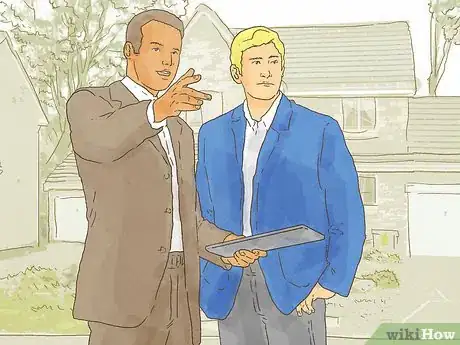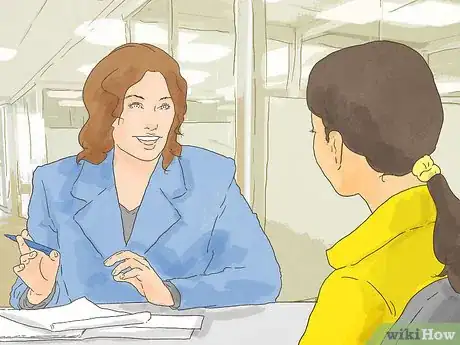This article was co-authored by Carla Toebe. Carla Toebe is a licensed Real Estate Broker in Richland, Washington. She has been an active real estate broker since 2005, and founded the real estate agency CT Realty LLC in 2013. She graduated from Washington State University with a BA in Business Administration and Management Information Systems.
This article has been viewed 376,284 times.
Whether you're buying or selling a property, a quality real estate agent is vital to make the process run smoothly. Seek out an agent with excellent credentials and references. Meet with a handful of agents to make sure any questions you have are answered. Watch out for potential red flags. Agents who charge very low costs or only work part-time may not be reliable.
Steps
Finding an Agent with the Right Credentials
-
1Look for someone who does at least 1 or 2 transactions every month. When reviewing an agent's credentials, look for someone who's been working in sales, negotiations, and contracts for at least five years, preferably in real estate or property management. Five years experience and a regular stream of transactions means an agent likely has a good feel for the process and can help find you the best deals.[1]
- Agents with less experience can still be a good choice if they know you and the area well, especially if they demonstrate a great work ethic and strong customer service skills.
-
2Find someone who works in your area. The agent you work with should know the area in which you're looking to buy or sell. Agents who live and work in your area will be aware of the best neighborhoods and trends regarding prices. A local agent will also know small details, like where the best schools are, commute times, and so on.[2]Advertisement
-
3Check the agent's license. Obviously, you want an agent who's properly licensed. Every state should have a list of licensed agents online. While making a list of agents to contact, check to ensure every agent you interview has a legal license to buy and sell real estate in your state. You can also see the continuing education classes they are taking which will help you to know what their focus is.[3]
-
4Look for awards and honors to help narrow your choices. Check a real estate's website and resume for awards, honors, and other signs of recognition. Things like a "Realtor of the Year" award can be a sign of a quality agent who's likely to exceed your personal needs. However, realize that it may also indicate a very busy Realtor who may not be the right choice if you'd like more individual attention and you may need to base your decision on other indicators.[4]
-
5Ask friends and family members for referrals. If you know someone who recently bought or sold a home, reach out to them. Friends and family members are likely to give you honest assessments of their experience with a particular agent.[5]
- However, be cautious about choosing an agent ONLY because a friend or family member recommended them. Your real estate needs and what you desire in a Realtor may be different so make sure you understand what exactly your friends or family's objectives were and what specifically they liked about their Realtor. Ask about any hesitations the person has recommending the agent as well. This way, you'll get a sense if the agent has any major flaws that would be a deal breaker for you.
Interviewing Real Estate Agents
-
1Ask how long they've been in business. When interviewing a real estate agent, one of the first questions to ask is how long they've been handling sales, contracts and negotiations for clients. They should be able to answer the question quickly and accurately. Remember, while five years of experience is ideal, someone with less experience who otherwise meets your needs may still work if you've developed a good rapport with them.[6]
- Also, ask how long the agent's been working in your area. Even better, ask if they live near the area. An agent with extensive experience may not be the best choice if they are not familiar with your particular area.
-
2Ask if they work alone or in a team. Agents who work alone are best if you want a lot of personal contact with the agent. Agents who work on a team are good if you like the idea of specialists for each step. The agent you hire may actually be a team leader who will then introduce you to a transaction coordinator, assistant, or buyer's agent who will handle those parts of the transaction.[7]
- Agents who work alone are more likely to walk you through each step themselves and more likely to reach out frequently by phone or even in person.
-
3Ask about any planned vacations or other commitments. Real estate often requires quick action and response time. If a Realtor has a vacation planned soon or some other commitment that might interfere with their availability, you need to decide whether this will affect you buying or selling a property. Make sure they have someone to help you out if they will have an extended absence.[8]
-
4Ask about what other properties they've sold. In addition to looking at current properties online, have the agent show you some of the other properties they've sold. Make sure these properties are similar to what you're looking to buy or sell. It's vital to pick an agent who works with the right properties for your needs. If the agent is typically used to working at a higher, or lower, price point, they may not understand your particular transaction as well.[9]
- If you're selling a home, ask where the home will be featured. The main places you'll need to be is on the MLS and the big online sites (Realtor.com, Zillow, Trulia, etc...). Other sites, including the agent's personal website aren't as important. Also, beware of an agent who wants to keep your house off the MLS for any reason. Unless you are selling a luxury home, the MLS is where most buyers, and their agents, are. "Pocket" listings or similar are generally suggested when an agent wants to market your house first to their own investor clients or to others in their brokerage, but limiting the exposure is almost never a good option for you as a seller.
-
5Contact their recent clients. Ask for a list of references after meeting with an agent. A quality agent will not hesitate to hand you a list of recent clients for you to call to ask about their experience. Call a few references for every agent you interview to make sure they have stellar reviews. Don't put too much stock in online reviews. Most people will give a 5 star review in exchange for a Starbucks gift card and a single bad review may not tell the whole story (ask the agent if you're concerned).[10]
-
6Make sure you get along with the agent. Chemistry is important in real estate. If you're working with someone who you don't get along with, this can cause unnecessary tension during an already stressful process. Make sure you click with the agent and feel comfortable in their presence.[11]
Watching for Red Flags
-
1Avoid agents who don't answer their phone or return calls. A good real estate agent considers their work a full-time job and knows that weekends and evenings can be the busiest times. In real estate, every day is a "business day" and if crucial items come up on evenings or weekends, you need an agent whom you can reach. An agent who isn't available throughout the day may not be your best option.
- If an agent does not answer during "regular business hours," you may have an agent who is doing real estate on the side. Their "day job" may not allow them to give you the attention you deserve.
- Conversely, an agent who doesn't answer evening or weekend calls, or worse yet, has a voicemail that states anything about "the next business day," may not be available when you need them.[12]
-
2Stay away from agents who don't know the area. If an agent does not work in your area, or cannot readily provide information about the area, this is a bad sign. A quality agent should be able to quickly rattle off things like neighborhoods, general price ranges, nearby businesses, and so on. If an agent cannot provide specific details about an area, you may want to find someone who knows it better.[13]
-
3Check that lower commissions don't mean fewer services. Typical commissions are usually between five and seven percent. When agent offers a lower commission, make sure they aren't offering you less service than higher commissioned agents. Before signing a contract, verify that all of their promises are in writing.[14]
- When buying, you don't usually have to worry about the commission because the seller generally pays both sides (buyer and seller) so focus instead on customer service and contract knowledge.
Expert Q&A
-
QuestionI'm looking for a great real estate agent in Bergen County, NJ. How do I find someone who is experienced with contingency, since we are selling and buying?
 Carla ToebeCarla Toebe is a licensed Real Estate Broker in Richland, Washington. She has been an active real estate broker since 2005, and founded the real estate agency CT Realty LLC in 2013. She graduated from Washington State University with a BA in Business Administration and Management Information Systems.
Carla ToebeCarla Toebe is a licensed Real Estate Broker in Richland, Washington. She has been an active real estate broker since 2005, and founded the real estate agency CT Realty LLC in 2013. She graduated from Washington State University with a BA in Business Administration and Management Information Systems.
Real Estate Broker Your best option is to ask someone you know for a recommendation. Another option is to drive around your community to see which agents are listed on for sale signs so that you can contact them. You can also search for agents online. Ask your potential agents if they have experience working with buyers who are also selling a home. Finally, ask them for references from previous clients who've gone through the same process.
Your best option is to ask someone you know for a recommendation. Another option is to drive around your community to see which agents are listed on for sale signs so that you can contact them. You can also search for agents online. Ask your potential agents if they have experience working with buyers who are also selling a home. Finally, ask them for references from previous clients who've gone through the same process.
References
- ↑ https://money.com/collection-post/how-to-choose-a-real-estate-agent/
- ↑ http://time.com/money/collection-post/2792050/how-to-choose-a-real-estate-agent/
- ↑ http://www.bankrate.com/finance/real-estate/7-tips-for-picking-a-real-estate-agent-1.aspx
- ↑ http://www.bankrate.com/finance/real-estate/7-tips-for-picking-a-real-estate-agent-1.aspx
- ↑ http://time.com/money/collection-post/2792050/how-to-choose-a-real-estate-agent/
- ↑ https://www.realtor.com/advice/buy/how-find-realtor/
- ↑ https://www.realtor.com/advice/buy/how-find-realtor/
- ↑ https://www.realtor.com/advice/buy/how-find-realtor/
- ↑ http://www.bankrate.com/finance/real-estate/7-tips-for-picking-a-real-estate-agent-1.aspx
- ↑ http://www.bankrate.com/finance/real-estate/7-tips-for-picking-a-real-estate-agent-1.aspx
- ↑ https://www.zillow.com/blog/how-to-find-best-agent-144573/
- ↑ http://money.usnews.com/money/personal-finance/articles/2014/11/07/9-red-flags-to-watch-for-when-picking-a-real-estate-agent
- ↑ http://money.usnews.com/money/personal-finance/articles/2014/11/07/9-red-flags-to-watch-for-when-picking-a-real-estate-agent
- ↑ http://money.usnews.com/money/personal-finance/articles/2014/11/07/9-red-flags-to-watch-for-when-picking-a-real-estate-agent
About This Article
To find a good real estate agent, start by creating a list of possible candidates who are local and have at least 5 years of experience. Next, check online to make sure each candidate is properly licensed before calling to set up interviews. During each interview, confirm how long the agent has been in the business, what properties they've sold recently, and which online sites they use to list properties. You can also ask for a list of references and contact their previous clients if you want to dig a little deeper before making a decision! For tips on spotting red flags, read on!















-Step-11.webp)






















-Step-11.webp)




































